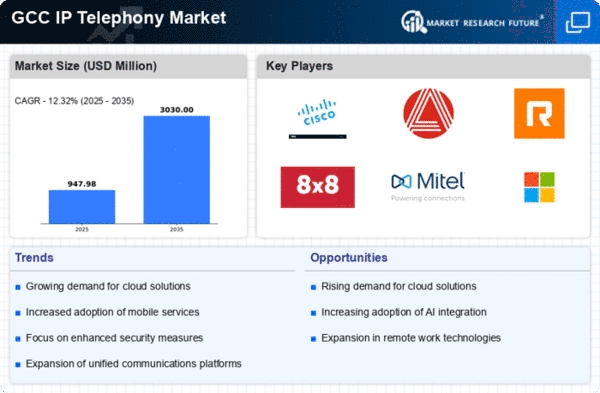Rising Focus on Customer Experience
Enhancing customer experience has become a critical priority for businesses in the GCC, driving the demand for advanced communication solutions in the ip telephony market. Organizations are increasingly adopting IP telephony systems that integrate customer relationship management (CRM) tools, enabling them to provide personalized and efficient service. Market data suggests that companies utilizing IP telephony solutions report a 25% improvement in customer satisfaction scores. This focus on customer-centric communication strategies is likely to propel the growth of the ip telephony market, as businesses seek to leverage technology to enhance interactions with their clients.
Advancements in Internet Infrastructure
The ongoing improvements in internet infrastructure across the GCC are significantly impacting the ip telephony market. Enhanced broadband connectivity and the rollout of 5G technology are enabling faster and more reliable communication services. This infrastructure development is crucial for the effective functioning of IP telephony systems, which rely on stable internet connections. Recent reports suggest that the penetration of high-speed internet in the region has reached over 90%, creating a conducive environment for the growth of IP telephony solutions. As businesses leverage these advancements, the ip telephony market is poised for expansion, with increased adoption of high-quality voice and video communication services.
Cost Efficiency and Operational Savings
Cost efficiency remains a primary driver for the adoption of IP telephony solutions in the GCC. Organizations are increasingly recognizing the potential for significant savings associated with transitioning from traditional telephony systems to IP-based solutions. The ip telephony market offers reduced operational costs, as it eliminates the need for extensive hardware and maintenance associated with legacy systems. Market analysis indicates that businesses can save up to 40% on communication expenses by implementing IP telephony solutions. This financial incentive is compelling for many organizations, prompting them to invest in modern communication technologies that enhance productivity while minimizing costs.
Growing Demand for Remote Work Solutions
The rise in remote work arrangements has led to an increased demand for effective communication tools, particularly in the ip telephony market. Organizations in the GCC are seeking solutions that facilitate seamless communication among distributed teams. This trend is reflected in the market data, which indicates that the adoption of IP telephony solutions has surged by approximately 30% in the last year alone. Companies are investing in advanced telephony systems that support remote collaboration, ensuring that employees can connect easily regardless of their location. As businesses continue to embrace flexible work environments, the ip telephony market is likely to experience sustained growth, driven by the need for reliable and efficient communication solutions.
Regulatory Support for Digital Transformation
The regulatory environment in the GCC is increasingly supportive of digital transformation initiatives, which is positively influencing the ip telephony market. Governments are promoting the adoption of advanced communication technologies as part of their broader economic diversification strategies. This support is evident in various initiatives aimed at enhancing digital infrastructure and encouraging businesses to adopt innovative solutions. As a result, the ip telephony market is likely to benefit from favorable policies and incentives that facilitate the transition to modern communication systems. The alignment of regulatory frameworks with technological advancements is expected to drive further growth in the sector.















